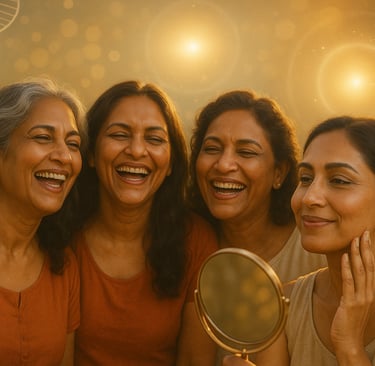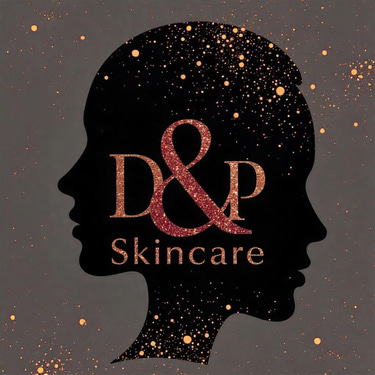Why Some Women GLOW After 30s?
Why do some women look luminous after 30? Spoiler: It’s mindset, not just moisturizer. Discover the psychology of ‘glow makers’—self-acceptance, stress resilience & ritual-driven skincare—and unlock your own radiant aging journey.
PSYCHOLOGY OF GLOW


If you've ever wondered why some women after 30 seem to radiate confidence and beauty while others struggle with their changing reflection, science has fascinating answers. The difference isn't in their skincare budget, genetics, or even their age—it's in their mindset.
Research shows that your relationship with your aging skin directly impacts how you age. Women who embrace their evolving beauty don't just feel better; they literally age more gracefully. This isn't wishful thinking—it's biology.
In this comprehensive guide, you'll discover the psychological factors that create that magnetic glow, backed by scientific research and practical strategies you can implement today.
The Science Behind Why Some Women Radiate Confidence After 30
You know her. You've seen her at work, social gatherings, or family events. She might be in her mid-30s dealing with the first signs of aging, her 40s navigating hormonal changes, or her 50s embracing mature skin. She has visible signs of aging—fine lines, changes in skin texture, maybe some gray hair.
But when she enters a room, something shifts. Conversations become more engaging. Even younger women with flawless skin seem to pale in comparison to her magnetic presence.
Research from the National Center for Biotechnology Information reveals that women with higher self-esteem show measurably better skin health markers. They sleep better, have lower stress hormone levels, and engage in more consistent self-care behaviors—all factors that directly impact skin appearance.
The fascinating part? Only about 30% of how radiant you appear comes from your actual skin condition. The remaining 70% stems from your confidence, posture, energy, and how you feel about yourself.
How Your Mirror Thoughts Age Your Skin Faster
Let's address that moment every woman faces—catching your reflection and thinking, "When did this happen?" Whether it's new fine lines at 32, hormonal skin changes at 38, or deeper expression lines at 45, that mirror moment can either accelerate or slow your aging process.
The Cortisol-Collagen Connection
When you look in the mirror and focus on what's "wrong," you trigger your body's stress response. This floods your system with cortisol, which has devastating effects on your skin:
Collagen breakdown: Cortisol directly breaks down collagen fibers, the protein responsible for skin elasticity and firmness
Inflammation increase: Chronic stress creates low-level inflammation that accelerates cellular aging
Sleep disruption: Stress affects sleep quality, when your skin does most of its repair work
Poor lifestyle choices: Stress often leads to neglecting self-care, irregular eating, and other aging accelerators
Studies show that women who practice regular negative self-talk demonstrate measurably faster signs of aging compared to those who maintain positive self-perception.
The 5-Second Rule for Mirror Moments
Before you spiral into self-criticism, try this evidence-based technique:
Pause: Count to five before reacting to your reflection
Breathe: Take one deep breath to activate your parasympathetic nervous system
Reframe: Find one thing you appreciate about what you see
Perspective: Remember that this face has lived, loved, and experienced life
Proceed: Continue with your routine from a place of self-compassion rather than criticism
Breaking Beauty Standards: The Modern Woman's Path to Radiant Aging
The pressure on women to look ageless has intensified with social media and digital beauty standards. You're expected to look fresh and professional while managing career demands, maintain your appearance for social events where everyone's comparing, and navigate family expectations about "taking care of yourself."
This pressure is particularly intense for women in their 30s and 40s, who often face the dual challenge of establishing themselves professionally while experiencing their first significant physical changes.
The Stress-Beauty Paradox
Here's the cruel irony: the more you stress about meeting impossible beauty standards, the more that stress shows on your face. Research indicates that women who feel constant pressure to maintain their appearance actually age faster due to elevated stress hormones.
Conversely, women who develop a healthier relationship with aging show better skin health markers, including:
Improved skin barrier function
Better hydration levels
Reduced inflammation markers
More consistent sleep patterns
Higher overall life satisfaction
The 70-30 Rule: Why Mindset Matters More Than Skincare Products
Understanding the science behind radiant aging can transform how you approach your beauty routine. The research is clear: your mental state has a more significant impact on how you age than most topical treatments.
The Biology of Confidence
When you feel good about yourself, several positive biological processes occur:
Improved Sleep Quality: Confidence reduces anxiety, leading to better sleep. During deep sleep, your body produces growth hormone, which repairs and regenerates skin cells.
Reduced Inflammation: Positive self-perception lowers chronic inflammation markers, which are directly linked to accelerated aging.
Better Stress Management: Confident women show lower cortisol levels throughout the day, preserving collagen and skin elasticity.
Enhanced Self-Care Behaviors: When you value yourself, you're more likely to maintain consistent healthy habits that support skin health.
The Hormone Connection
Your emotional state directly influences hormone production:
Cortisol: Chronic stress elevates this aging hormone
Growth Hormone: Adequate sleep and positive mood support its production
Estrogen: Stress can disrupt hormonal balance, affecting skin thickness and moisture
Oxytocin: Positive social connections boost this "bonding hormone," which has anti-inflammatory effects
Breaking Generational Patterns of Beauty Criticism
Many women inherit critical beauty standards from previous generations. Your mother's comments about her own appearance, your grandmother's relationship with aging, and cultural messages about women's worth being tied to youth all shape how you see your own reflection.
The Mother-Daughter Beauty Connection
Research demonstrates that negative body image often transfers from mother to daughter. However, you have the power to break this cycle, not just for yourself but for the younger women in your life.
Instead of saying: "I look so old" or "These wrinkles are terrible" Try: "I love how my face shows my experiences" or "These lines come from years of laughter"
This shift doesn't just change how you feel—it models healthy aging for the next generation.
Cultural Shift Toward Positive Aging
The beauty industry is slowly recognizing that "anti-aging" messaging can be harmful. The new approach focuses on "positive aging" or "graceful aging"—celebrating the beauty that comes with experience and wisdom.
7 Evidence-Based Strategies for Glowing Confidence After 30
1. The Morning Mirror Gratitude Practice
Start each day by finding one thing you appreciate about your appearance. This small habit rewires your brain to notice beauty rather than flaws.
2. Reframe Age Marks as Life Markers
Transform your internal dialogue:
Laugh lines become "joy lines"
Sun spots become "adventure marks"
Gray hair becomes "wisdom highlights"
3. The Confidence Posture Technique
Research shows that posture directly affects confidence levels. Stand tall, shoulders back, and you'll literally feel more confident—which shows in your face.
4. Social Media Boundaries for Mental Health
Limit exposure to heavily filtered or edited images. Follow accounts that showcase authentic aging and real skin textures.
5. Build a Support Network of Positive Women
Surround yourself with women who model healthy relationships with aging. Their attitudes are contagious.
6. Practice Stress-Skin Awareness
Notice how your skin looks after stressful periods versus calm times. This awareness helps you prioritize stress management as skincare.
7. Create Your Personal Glow Ritual
Develop a routine that makes you feel cared for, whether it's a skincare routine, exercise, meditation, or creative activities.
Common Questions About Radiant Aging
Is it too late to build confidence if I'm already in my 40s or 50s?
Absolutely not. Neuroplasticity research shows that our brains can form new neural pathways at any age. Many women report feeling more confident in their 40s and 50s than they did in their 20s.
How long does it take to see changes from improved self-esteem?
While internal changes happen immediately, visible improvements in skin often become noticeable within 4-6 weeks of consistent positive practices, primarily due to better sleep and reduced stress.
What about hormonal changes during perimenopause and menopause?
Hormonal fluctuations are real and affect skin health. However, women who maintain positive self-perception during these transitions show better adaptation and fewer severe symptoms.
How do I handle criticism about my appearance from others?
Remember that comments about your appearance often reflect the critic's own insecurities. Respond with confidence: "I feel great about how I look" or simply don't engage with appearance-focused criticism.
Can therapy help with appearance anxiety?
Yes. Cognitive-behavioral therapy has proven effective for appearance-related anxiety and can help reshape negative thought patterns about aging.
Your Journey to Radiant Aging Starts Now
The secret to that magnetic glow isn't hidden in expensive creams or complicated routines. It's in how you choose to see yourself and your relationship with the natural aging process.
Remember: you're not fighting time—you're working with it. Every line tells a story. Every change reflects a life fully lived. When you embrace this perspective, you join the ranks of women who seem to glow from within, regardless of their age.
Your immediate action step: Tomorrow morning, before applying any products, look in the mirror and say one kind thing about your face. Notice how this small shift affects your entire day.
This is the first article in our 7-part series "The Psychology of Radiant Skin." Next week, we'll explore the biological changes that happen as we age and how your response to these changes can either accelerate or slow down the aging process.
References:
Impact of skin care on body image of aging people: A quasi-randomized pilot trial, PMC
Usage Patterns and Self-Esteem of Female Consumers of Antiaging Cosmetic Products, MDPI
The relationship between stress and skin aging: A systematic review, Journal of Clinical Medicine
Body image and psychological well-being in aging women, Psychology & Health
